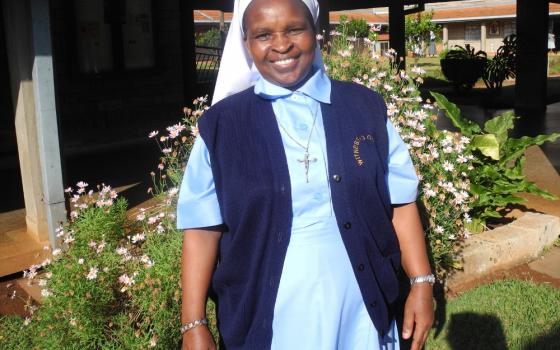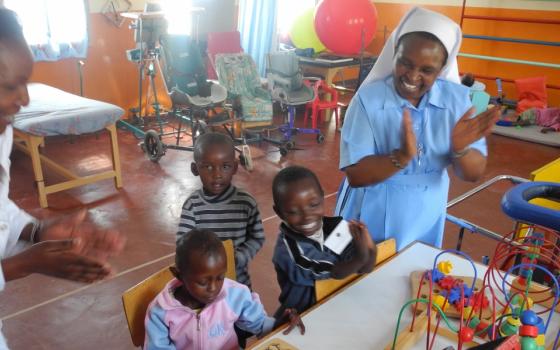Sr. Jane Wanjiru wants the sisters working as preschool teachers to schmooze. She wants them to network with each other, with local non-profits, with government ministries, with sisters around the world. She wants them to connect to anyone and everyone who increase their knowledge about early childhood education and running effective organizations.
Wanjiru is the Kenya coordinator for a program that utilizes sisters working as early childhood educators to help the country’s 150 congregations reflect on their strengths and weaknesses to improve sisterhood there. The program, called SCORE (Strengthening the Capacity of Women Religious in ECD - Early Childhood Development), is run by Catholic Relief Services and the Association of Sisterhoods of Kenya, and funded by a grant from the Conrad N. Hilton Foundation, which also funds Global Sisters Report.
Wanjiru is like a smiling ball of energy, bouncing around the country to visit sisters in the farthest-flung corners of Kenya. Global Sisters Report met up with her in between travels in her Nairobi office, to understand more about why she spends so many hours on the road, training sisters who work with young children.
Why did you decide to focus on sisters working with young children?
Strengthening the capacity of sisters working with children of this age is very important. If children don’t receive the support they need at this age, they will never flourish. This is the age where we are giving children a foundation for the rest of their lives, but it’s a very delicate time. Also, these are future priests and sisters, and also presidents and leaders. We are targeting holistic development: health, spiritual, physical, emotional, moral, psychological, social, mental and cognitive.
What does the SCORE program do?
We started in March 2014. The program is in three countries: Kenya, Malawi and Zambia. We have 450 sisters involved with the program. In Kenya, the sisters come to Nairobi for week-long seminars throughout the three years of the project. We also travel around the country to visit them at their sites, to see the types of facilities they have, and their challenges. We have three objectives – increased technical capacity, increased organizational sustainability, and increased networking to learn about early childhood development.
How do you determine a congregation’s organizational sustainability?
We do what’s called HOCAI training, which stands for Holistic Organizational Capacity Assessment Instrument. We want sisters to be able to assess their own congregations, to understand their identity as a congregation and how they’re using money, human resources – or delivering the services like a nursery. So we trained sisters in the HOCAI methodology. Then they gathered a team in their own congregation to assess themselves. They realized they’re weak in a number of areas, including human resource management, fund development, strategic planning, external relations, and networking. We want to empower the sisters so that we become experts in our field and our work is professional.
What did these assessments reveal?
We learned that sisters do not learn from each other. They don’t talk to the neighboring congregations, and they don’t attend government meetings or NGO meetings. What that means is that we’re stuck with our own knowledge and we’re not expanding our knowledge. We want them to network with other congregations, both local and international. We should be attending government meetings, like the Ministry of Health or the Ministry of Education, to see if we can benefit. Also, sisters need to learn how to keep money records, how to look for funds to write a proposal and how to make reports.
What is it like spending most of your time on the road visiting projects?
I travel a lot with CRS. I got tired at the beginning, but now I’m getting used to it. When I visit a convent of sisters, they are always very happy for that experience. They tell me, ‘You are opening our minds. We thought we were doing very well, but it turns out we’re behind the times.’ Others told me they never thought of approaching the Ministry of Education for help or support. Now, for example, the Little Daughters of St. Joseph in Nyeri [a town in Kenya’s interior] are working hand in hand with the government, and they get support for their school and purchasing medicine for the children. The sisters tell me, ‘We sacrifice our lives for these children, but we need support.’
[Melanie Lidman is Middle East and Africa correspondent for Global Sisters Report based in Israel.]


